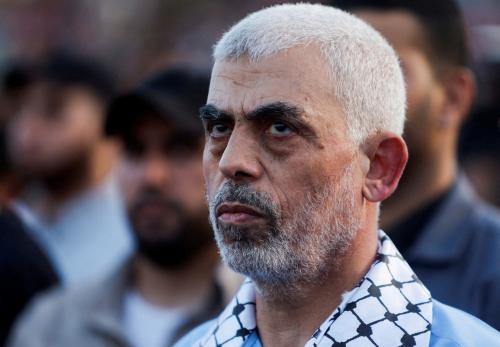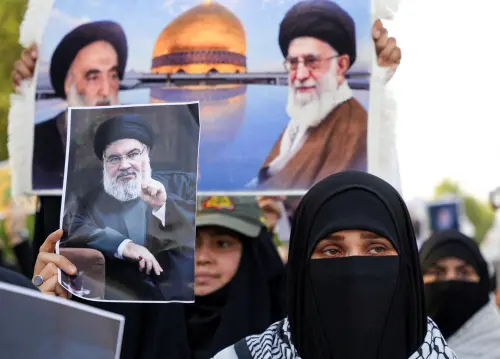So which U.S. President George W. Bush was right? The one who said Aug. 30, the day the Republican National Convention started, that the war on terror might not be winnable, or the Bush who showed up the rest of the week and asserted that victory would be ours?
The question has become a political one used by the Kerry campaign to question Bush’s resolve and judgment. But the real issue is strategic: As we attempt to devise the right type of foreign policy to address the problem of violent Islamic extremism, we need to know which argument is correct.
In reality, in important ways Bush was right both times. We are indeed winning the current set of campaigns against the first generation of al-Qaeda—Osama bin Laden and his close associates, most of whom are now dead or behind bars, and the rest of whom are on the run and less able to plot and plan than three years ago. But we are decidedly not winning, at least not yet, against the second generation of al-Qaeda.
This group includes affiliates of the core bin Laden group in places ranging from Spain and Indonesia to Morocco, Saudi Arabia and Iraq, who are inspired by bin Laden’s rhetoric and record but operate independently. It also includes those younger Muslim fundamentalists around the world—a minority among Muslims, to be sure, but a large number nonetheless—who are being recruited into extremist organizations at this very moment.
As U.S. Defense Secretary Donald Rumsfeld has twice argued in the last year, most recently in Singapore in June, we have no reason to think we are prevailing against this generation of terrorists and no coherent strategy for doing so. Unfortunately, with the partial exception of an Aug. 30 speech given by Democratic presidential candidate John Kerry’s running mate, North Carolina Sen. John Edwards, neither presidential campaign has seriously addressed the question of how to develop such a strategy. It is high time they did.
Bush has undertaken individual pieces of the type of broad agenda that is needed to reverse this highly dangerous historic trend. He has added funding for fledgling nongovernmental groups in the Middle East, attempted to re-engage in the Mideast peace process, pushed Saudi Arabia to clamp down on extremist propaganda in its schools and negotiated a trade accord with Morocco designed in part to give its people more opportunity and more hope.
But the efforts have been piecemeal, small in scale and, in most cases, unsuccessful. And the absence of most major Arab leaders from the Group of Eight summit in June at Sea Island, Georgia, meant that the administration’s launch of a Mideast reform initiative constituted one more example of apparent unilateralism that undermined itself from the start.
Although a Kerry/Edwards administration would probably help address the problem somewhat, given Bush’s unpopularity in much of the Islamic world, a successful strategy would require much more than replacing him with a more multilateralist U.S. leader. After all, the schism between the West and Islam was evident under Presidents George H.W. Bush and Bill Clinton; it is not due exclusively to this administration’s policies by any means. The fact that the 9/11 attacks were primarily planned during the Clinton years is ample proof of this fact.
How can we address this problem? The first key is to recognize that we confront a problem of historic magnitude, with deep roots in the colonial past and the troubled present of Arab politics. Addressing Islamic fundamentalism, and America’s poor relations with much of the Muslim world, is therefore sure to be a long-term struggle. In many ways it is akin to the Cold War—a long, hard slog, much of it taking part in the realm of ideas but still with a decided security threat. Many policy instruments will be needed if we are to be successful. So will patience and perseverance.
Part of the answer is to use presidential summitry effectively. Although he was already out of office at the time, Clinton provides an example of how one might approach this tone in a speech he gave to a set of American and Muslim world leaders in Qatar last January.
He expressed admiration for Islam’s culture and history. He noted its common roots with Christianity and Judaism. He acknowledged the West’s tendency to be ignorant of the many aspects and characteristics and countries of the Islamic world—while at the same time challenging the common misperception among Muslims that the United States is indifferent to their well being and always opposed to their interests.
There should be various ways of holding similar dialogues and finding similar language for the newly elected American president, be he Kerry or Bush.
Of course, greater interaction between Western and Islamic societies should not depend exclusively or even primarily on official summitry. Universities and think tanks can make a contribution as well. Government funding, delivered through an independent organization, may be useful for some such efforts, but many if not most should be unofficial and unabridged and uncensured. Debate should be as prevalent as agreement, and it should cover a range of issues from religious doctrine to historical grievances and legacies to the role of women in society, the media and foreign policy issues.
Further, the U.S. should follow former CIA Director Robert M. Gates’ suggestion to ensure that more Islamic students can study in the U.S., and that other legitimate visitors can come to this country without undue hassle, delay or limitations (necessitating more resources for various visa and immigration services).
Beyond the matter of formal education, the U.S. and other Western countries should endeavor to make their ideas and their resources available to more Muslims. Innovative uses of new technology, such as many U.S. Information Agency-sponsored Internet centers made easily and cheaply and widely available, could be more effective than the cultural centers of old.
To understand how twisted versions of Islam can lead to terrorism—but even more so to understand its positive aspects and to become more capable of working with moderate Muslims who share our goals for defeating extremism—the U.S. should develop initiatives to help the American public better understand this great religion and civilization. Acquainting more Americans with the Muslim world, Islamic history, the Quran and the Arabic language earlier in life could also help solve an enduring problem of our government—the dearth of Arabic-speaking diplomats, soldiers and intelligence experts.
This initiative could have many aspects. It could include expansion of foreign-language and cultural-awareness programs in secondary and college education as well as in professional military and governmental training.
A second idea could feature the launch of joint speaker and writer programs, involving sending more Americans abroad as well as bringing in Muslim world speakers, writers and journalists to engage with the U.S. public. The idea should be partly to help both sides better understand the opinions, aspirations, grievances and accolades of each other. The joint nature of the initiative would underscore that the U.S. and Muslim world do share important values and undermine the claims made by radicals of an inevitable and worsening clash of civilizations.
As Edwards recently argued, major support for educational reform in the Islamic world is also required—wherever countries are prepared to put aid resources to good use in creating schools with more nuanced curricula and a lesser role for firebrand clerics. Pakistan, Yemen, Indonesia and other poorer Islamic countries could benefit greatly from more aid for such efforts. Despite the Bush rhetoric, recent reports are that Pakistan has made little to no progress in regulating or reforming its Islamic religious schools, or madrassas, underscoring the problem.
What is needed is a pro-education agenda to complement the president’s millennium challenge account concept for well-performing countries. Many of the Islamic countries at issue do not meet the president’s criteria to qualify for additional aid funds under the Millennium Challenge Account. But one can make the case that helping them is urgent enough on national security grounds and thus requires a separate new and bold effort. A global education initiative on a scale of $20 billion a year in donor funds is justified based on World Bank and other analyses; America’s share for the Islamic world could cost $3 billion to $5 billion annually.
Other efforts are needed too, ranging from activities to promote political reform within the Islamic world to more trade accords with Islamic states to a major push for a renewed Mideast peace process. The point, however, is less to settle on a specific program for preventing a clash of civilizations—and recruitment of a potentially huge next generation of al-Qaeda terrorists—than to realize we need a historic scale of effort and commitment. And while it is already late in the game, it is essential that this year’s U.S. presidential race begin to address what could well be the chief challenge of our times.
The Brookings Institution is committed to quality, independence, and impact.
We are supported by a diverse array of funders. In line with our values and policies, each Brookings publication represents the sole views of its author(s).



Commentary
Op-edNo Long-Term Gains Against Terror Yet
September 8, 2004